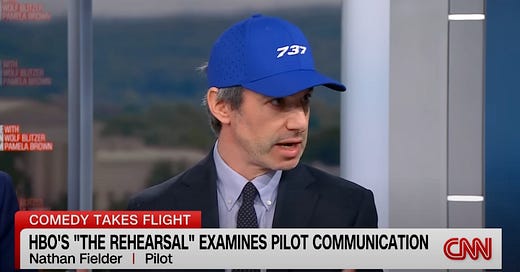3 Questions w/Phil: The Rehearsal
Many people are discussing the aviation safety topics covered in Season 2 of The Rehearsal. Here I answer 3 questions I've received related to it.
“3 Questions w/Phil” is a new series where…big shock…I answer three questions. They will usually bring short-form answers that relate to a single topic, although sometimes the questions may be random. Like other articles, I may cover some historical event, explain the inner workings of the aviation industry, or give my personal perspective or experiences with something.
All questions are things others have asked me, or submitted from readers like you. Please send your topics and questions to phildernerjr@gmail.com.
“The Rehearsal” is a surreal docu-comedy airing on HBO where Nathan Fielder helps people prepare for real-life events by building elaborate simulations. Season 2 focuses on aviation safety, using full-scale recreations and social experiments to explore how communication failures inside the flight deck contribute to plane crashes.
1. Have you seen Nathan Fielder’s “The Rehearsal?”
I have. I’ve watched both seasons. I actually didn’t realize, until they said it at the beginning of the second season, that it was intended to be a comedy. Although I did find some parts funny, I just thought it was an awkward man creating a socially awkward documentary.
2. What do you think of his theory about communication in the flight deck?
I feel he leaned into the cockpit communication issue pretty hard, and I don’t think it’s as big of a problem as he’s making it out to be, or at least not in the way he’s presenting it. I think he failed to prove the problem he was solving. He’s setting out to make changes at the FAA, but he cited accidents that were outside the FAA’s jurisdiction (in other countries), or US-based accidents that are as old as I am.
As the great John Goglia pointed out in the program, the industry has made tremendous strides in Cockpit/Crew Resource Management (CRM). I think the trend of accidents involving poor intra-flight deck communication in the United States has generally passed.
Communication issues in aviation certainly still exist, but I don’t think there’s as much fear of speaking up anymore as he implies and I don’t think what he’s proposing is the missing link he claims it is.
I was mostly surprised at his overall goal of forcing more socializing among pilots, considering that he himself struggles so much with social interactions, which he has no problem admitting to. Why does he expect more or different from others?
3. So was there anything useful from the show?
First, it was certainly entertaining. The lengths he’s willing to go to make a point such as with set design, social experiments, and even extensive pilot training (that was incredible) are very impressive.
As for his theory, I don’t think he’s totally wrong. I do think there’s room for more role-playing in the flight deck as a means of practicing CRM and running through processes and emergency checklists. However, I think there are more pressing safety issues in our industry.
The show does shine a light on a few other topics, such as toxic behavior within the flight deck. Racist and sexist political conversation is something that exists and is not rare. I’ve seen it myself and I still hear horror stories from colleagues. What we saw from the man who says he was banned from every dating app and still doesn’t even consider that it could be due to his own behavior, is sadly common. When this happens in a confined space where the other person can’t walk away, and where their teamwork affects safety, is a major issue. Fielder’s socializing idea would only exacerbate that threat.
The show also touches on mental health and the stigma that still exists in the industry. I wish he dove more into that, or maybe even revolved the season around it as its primary topic.
But one thing I love is the public response we’re seeing to the show: we’re talking about it! General conversation about safety is something we should continue to have. So even though I don’t fully agree with the concept being promoted, I think it’s great to watch, and I welcome the discussion.
Disclaimer: The views expressed in this article are solely my own and do not represent the positions of my employer or any affiliated organizations. This content is for informational and entertainment purposes only and is not intended as professional advice.


